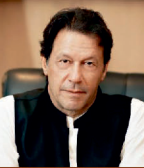
Imran Ahmad Khan
The general elections in Pakistan in 2018 marked a significant turning point in the country’s political landscape. The Pakistan Tehreek-e-Insaf (PTI), led by former cricket star Imran Khan, emerged victorious, securing the largest number of seats in the National Assembly. This article examines the context, campaigns, and the establishment of Imran Khan’s government following the historic elections of 2018.
Context and Political Landscape
Before the 2018 elections, Pakistan had been under the government of the Pakistan Muslim League-Nawaz (PML-N), led by Prime Minister Nawaz Sharif. However, Sharif’s government faced a series of challenges, including allegations of corruption and governance issues. Sharif was disqualified from office by the Supreme Court of Pakistan in July 2017, leading to political turbulence and the appointment of Shahid Khaqan Abbasi as the interim Prime Minister.
The 2018 elections were seen as crucial for Pakistan’s democratic transition, with multiple political parties vying for power. Imran Khan’s PTI emerged as a major contender, promising a platform of change, anti-corruption, and good governance.
Campaigns and Key Issues
Imran Khan’s campaign for the 2018 elections focused on several key issues:
Anti-Corruption: PTI promised to tackle corruption at all levels of government and hold those involved in corrupt practices accountable.
Economic Reform: The party emphasized the need for economic stability and reform, aiming to improve Pakistan’s economic prospects and address issues such as inflation and unemployment.
Healthcare and Education: PTI advocated for better healthcare and education systems, with a focus on improving access and quality.
Foreign Policy: Imran Khan’s stance on foreign policy, particularly relations with the United States and India, was a significant part of his campaign. He advocated for balanced and respectful international relations.
Empowerment of Youth: PTI highlighted the importance of engaging Pakistan’s youth in the political process and providing opportunities for their growth and development.
Election Results and Government Formation
The 2018 general elections saw a high voter turnout, with millions of Pakistanis participating in the democratic process. When the results were announced, PTI emerged as the largest party in the National Assembly, though it did not secure an absolute majority. Imran Khan’s charismatic leadership and promises of change resonated with voters, and PTI was able to form a coalition government at the federal level and in several provinces.
Imran Khan was elected as the 22nd Prime Minister of Pakistan in August 2018. His government faced the significant task of addressing the challenges and issues highlighted during the campaign while fostering economic stability and development.
Challenges and Achievements
Imran Khan’s government has faced a series of challenges during its tenure, including economic difficulties, governance issues, and the ongoing fight against terrorism. The government has also launched initiatives such as the Ehsaas Program, aimed at providing financial assistance to vulnerable segments of society.
Pakistan’s foreign policy has been a subject of interest and scrutiny, particularly in the context of relations with neighboring India and the United States. Imran Khan’s government has made efforts to improve regional stability and promote dialogue.
Conclusion
Pakistan’s general elections in 2018 and the establishment of Imran Khan’s government represented a significant moment in the nation’s political history. The PTI’s victory signaled a desire for change and reform, and the government has since worked to address the country’s challenges while pursuing its vision for a more prosperous and stable Pakistan. As Pakistan continues on its democratic path, the legacy of the 2018 elections will undoubtedly shape the nation’s political landscape for years to come.

